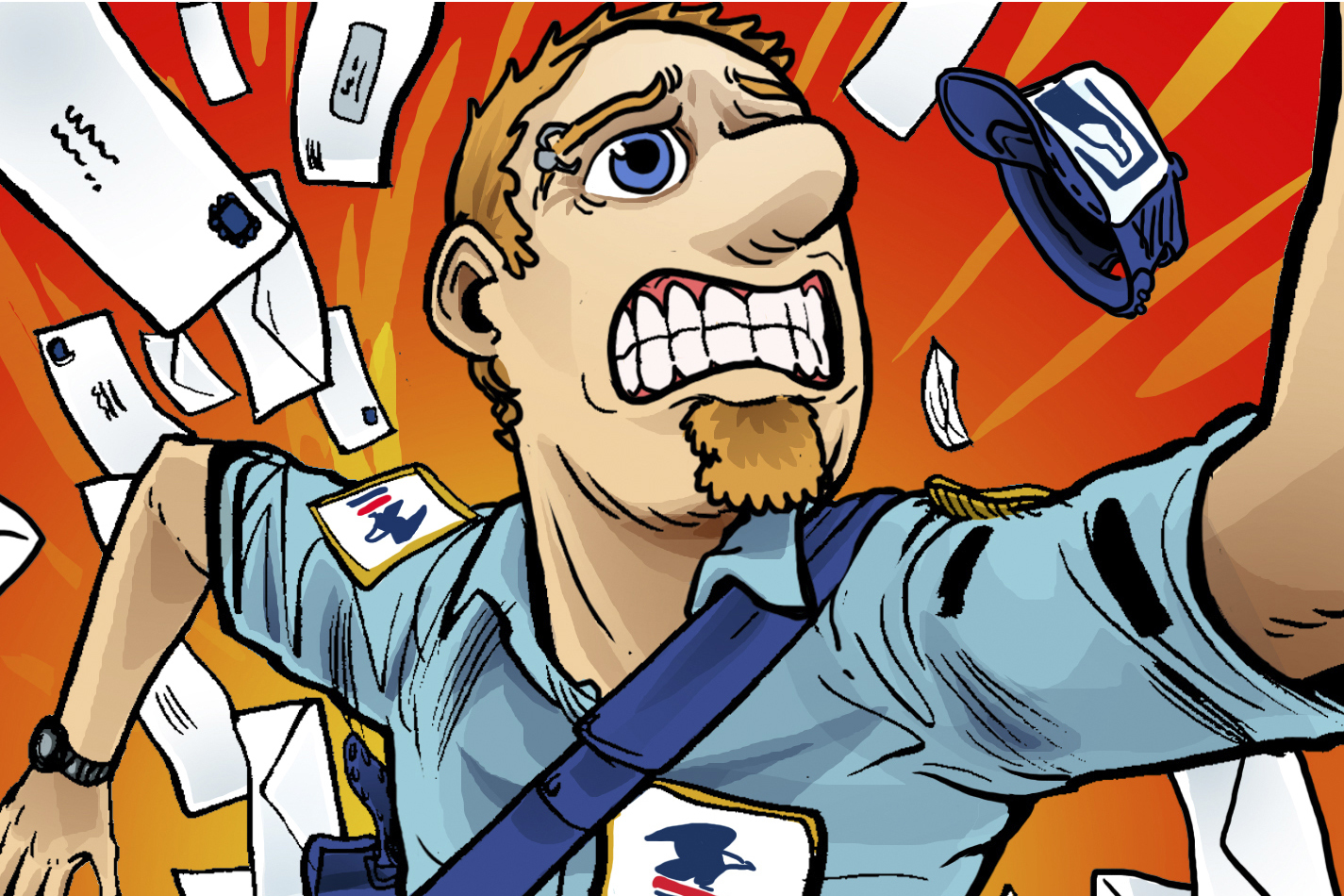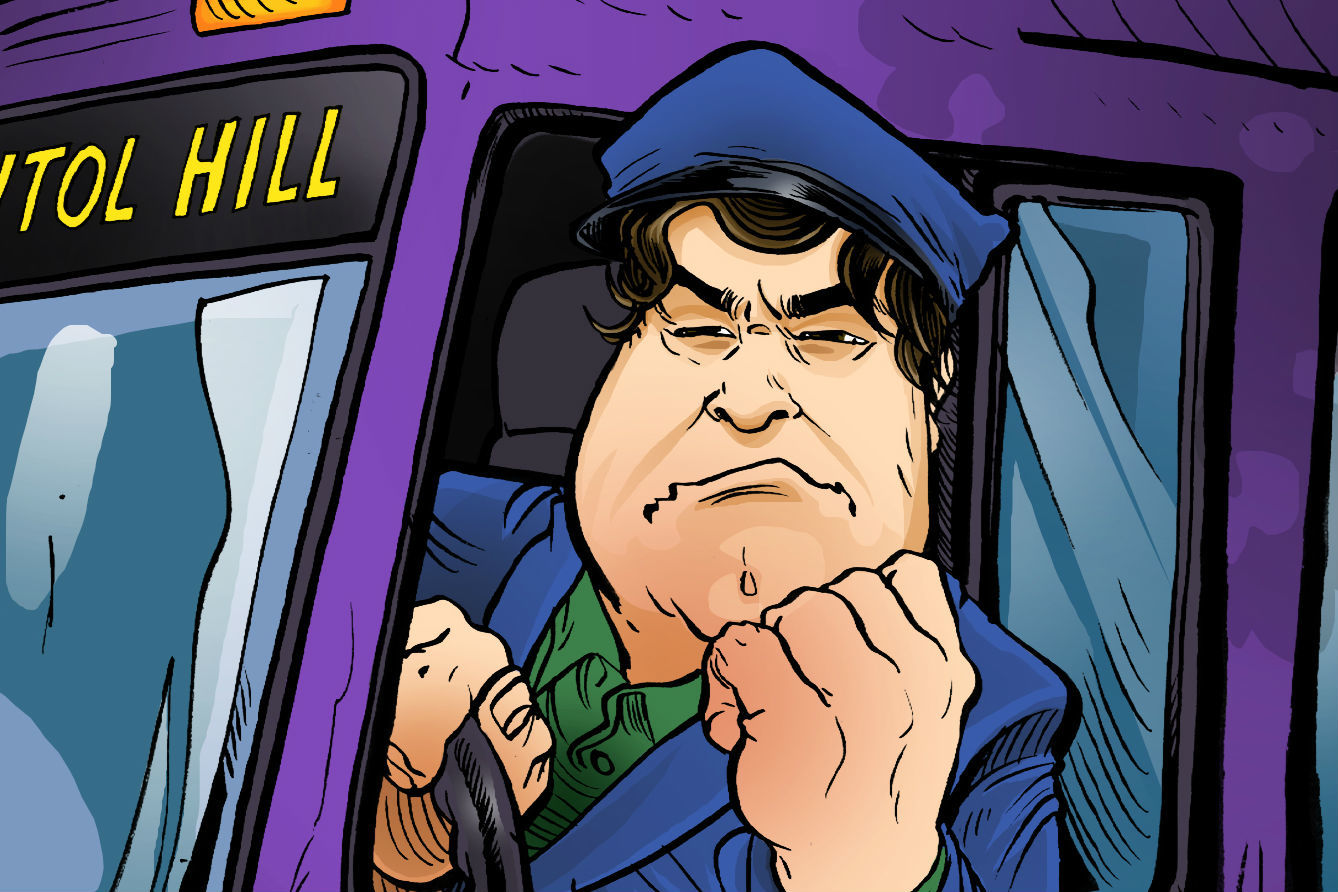I had wanted to be a letter carrier for years. I envied their strolling along peaceful streets, dropping envelopes into slots and enjoying the weather. That’s all you did, right? And the pay was good.
In February 2014, I applied for a city carrier assistant position and was assigned to University Post Office. The position was a compromise of sorts between the unionized full-time carriers the postal services had been eliminating as fast as it could and a temporary day worker.
My first day, my on-the-job trainer led me to some huge canvas carts on wheels full of incoming flats, letters, third-class, parcel post, rejects, everything. I was to remove and sort it—fast.
“Grab a bunch from the top,” she said. A super-fit woman with 10 years experience, in 10 seconds she had sorted 50 pieces into piles. The next step was casing: placing envelopes and flats into vertical slots, depending on the route. When that’s done, you hit your route. This was where the leisurely strolling was supposed to come in. It did not.
Mail is not delivered in numerical order. It’s delivered according to the best way for the carrier to minimize the time spent. You finish one block, cross the street and do another block, then circle around to where you left off and continue in the most efficient order, regardless of house numbers.
“What street are we on?” the supervisor grilled me.
“Northeast 54th.”
“What’s the next intersection?” “Uh, Van Dyke Ave.”
“Good, where does this piece go?” “Uh, Northeast 52nd…”
“Nope. 54th.”
“But what address?”
“Next to 1372 Northeast 53rd, because you’re crossing the street there, right?”
Sure. Whatever.
Each morning I logged in and loaded the one-ton canvas cart and pushed it through the doors and down the ramp, chose a truck, and loaded the mail in the best order for that day. Loading the truck requires thought—a bad plan costs a lot of time. Then you need to know where you will start your first “swing.”
As I struggled to push my truck across the floor of the staging area, a carrier passed me. “Fuck you,” he said. Another carrier passed in front of my cart and said, “Asshole.” The permanent carriers see city carrier assistants like me as scabs, taking jobs from full-time carriers. CCAs are part-time, on call, with 90 days of probation and no guarantee of becoming permanent. I had to work weekends and overtime if asked. If there was no work, I’d get two hours pay for showing up, and go home. That was the deal. As a non-union worker, there were no protections from getting fired for minor transgressions of the service’s stringent rules. During training, a carrier told me, “You could have been terminated for that.”
For what?
“You walked between the yellow lines and took out your phone. If a supervisor saw you, you’d be reprimanded. Don’t ignore the rules. You hear beeping, you STOP. Enter the floor only when you have permission. Forget your badge and you’re in trouble. I’m serious.”
The rules weren’t out of any concern for us, mind you. In the classroom training, I was asked, “Dogs will try to bite you. Why is that bad?”
“Because I’m hurt?”
“NO! Because you will have to see a doctor and you might lose a day of work, and that will cost us money, and you might sue us, so DON’T GET BITTEN!”
Once, as my trainer watched me approach the houses, she said, “I could have you terminated for that.”
For what!?
“You put mail into the slot, but you heard a dog barking, didn’t you?”
“Yes.”
“That dog could have bitten your fingers. If your fingers had been bitten inside the slot, you’d have to see a doctor. DON’T PUT MAIL IN A SLOT IF YOU HEAR A DOG!!”
The houses in neighborhoods such as Laurelhurst have staircases from the sidewalk to the door. You don’t know where the mail boxes or slots are located. You climb up one staircase only to find it’s the wrong one. So down you go, and up the other staircase. But the mailbox might be next to a tree or on the garage door—and painted the same white as the door, or hidden by shrubs. At every house I faced the challenge of finding the box or slot. “Where are you looking? Not there.” I’d say, “I don’t know!” It was far from obvious. One day I slammed my mail on the ground and yelled, “FUCK!” My trainer said, “Pick it up. Next time I will have to report it.”
A week later, the station manager said, “Don’t yell obscenities near houses.” “Yes, sir.” “The next time, you’re done.”
On my first route I was pulling mail and packages from the rear of the truck when a carrier drove up and said, “What the fuck are you doing? Why are you parked here?”
I said, “This is a legal parking spot.”
“Jesus Christ, don’t park in legal spots—the cops don’t ticket us! Park in No Parking zones, for Christ’s sake. You’ll never get done.”
There are two worlds at the U.S. Postal Service: the rule book, and the real world. The rules are used to fire employees, but the employees won’t last if they follow them. There’s a time to obey the rules and a time to break them. It’s called survival skills. And survival depends on one thing: You have to finish your swings.
“Look, you can’t walk back to 50th Street, because that’s 10 minutes wasted and you’re already way behind. The supervisors will kill you for that. What swing are you on?”
“I finished two and I have three more.”
“Holy shit. You’ll never make it back by 4. We have to be back by 4! ”
At Jack in the Box for lunch, a carrier called out, “You OK?”
I said, “Yes, thanks.”
He said, “Why are you here?”
I said, “For lunch.”
“I know, but so far from your truck? I know your route. You’re too far from your truck. EAT IN YOUR TRUCK.” I stuffed my mouth with a cheeseburger. We’re supposed to take 20 minutes for lunch, but we can’t. I’d learn.
I was parked near my truck when a man got out of the car behind me. “How’s it going?”
I said, “Can I help you?”
“I’m the station master. Heard you might be in a little trouble, so I decided to help. I’ll walk with you for 20 minutes. What’s your next building?” He showed me how fast he could open and stuff busted old mail boxes. The implication was: That’s what I expect of you!
Back in his office, the station master said, “Mr. Segal, you took six hours to finish a 1.5 hour route. You need to improve, FAST. Tomorrow I need you to do a two-hour route with four swings, in four hours. I’m giving you double the normal time. If you can’t do that, I’ll have to let you go.
I said, “I don’t think I can do it.”
He replied, “I don’t mean disrespect, but you’re not good at this. It’s not for everyone. See you tomorrow and good luck.”
The next day I called the supervisor and said, “I’m not returning. I’ll mail my badge.” Thus ended my auspicious career with the United States Post Office.
news@seattleweekly.com






